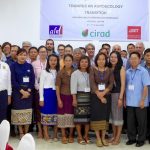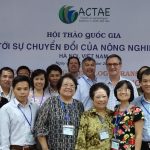11 downloads
Title of document: Strategic Plan of Action on ASEAN Cooperation in Crop (2016-2020) Authors: ONG Keng Ho Ministry/Government Agency/Organisation: ASEAN Year of publication: 7/3/2014 Geographic focus: ASEAN Url original document: http://asean-agrifood.org/wp-content/uploads/2014/12/Strategic-plan-for-ASEAN-working-on-Crop_140718-report.crops_.pdf Summary: The purpose of this is to assist agriculture industries and natural resources division in deveoping the objectives, goals, strategies of the ASEAN 5 years (2016-2010) Strategic Plan of Action (SPA) for crop sector and in providing recommendations to enhance and facilitate the implementation of this 2016-2010 SPA. Read More
21 downloads
Title of document: Organic Agriculture and Post 2015 Development Goals: building on the comparative advantage of poor farmers Authors: Sununtar Setboonsarng, Anil Markandya & al. Ministry/Government Agency/Organisation: ADB Year of publication: 2015 Geographic focus: South East Asia Url original document: http://www.adb.org/publications/organic-agriculture-and-post-2015-development-goals Summary: The book makes an evidence-based case for organic agriculture in developing countries, particularly those in Southeast Asia. It starts by examining the data from organic agriculture farms, comparing them with those from nonorganic agriculture farms to see what can be said about the effects of organic agriculture on the livelihoods of comparable people and in terms of the MDGs (Chapters 1, 8, and 9). The book then goes on to look at the economic dimension of promoting organic agriculture and actual experiences in implementing it. It explores the following questions: Are the benefits of such programs justified in terms of their costs (Chapter 2)? Does certification help farmers in terms of increased incomes for their products (Chapter 3)? How well has certification worked to increase incomes and livelihoods in particular cases (Chapter 4)? Which benefits motivate farmers to adopt organic agriculture (Chapter 5)? (This is important as a guide to which policies to use to promote the practice.) Is organic agriculture the best way to improve rural livelihoods, or can we do better through other interventions, such as promoting biofuels (Chapter 6)? What are the macroeconomic impacts of promoting organic agriculture (Chapter 7)? Following these chapters, the book looks at evidence on some of the big environmental questions related to sustainable agriculture. The first is its role in sequestering carbon, a major issue given the threats we face from climate change (Chapter 11). A second is enhancing biodiversity and preventing the loss of genetic material (Chapter 12). Finally, the book considers some of the big issues in the debate surrounding agriculture which touch on organic agriculture in developing countries. One deals with the environmental costs of shipping agricultural products over large distances (food miles, Chapter 13). Another is whether organic agriculture does indeed lower yields and thereby reduce our capacity to feed the growing population of the planet (Chapter 14). Read More

38 downloads
Title of document: Proceeding of the National Workshop on Agroecology Transition in Lao PDR Authors: Pierre Ferrand and Dr. Saythong Vilayvong Ministry/Government Agency/Organisation: ALiSEA Year of publication: 2016 Geographic focus: Laos Url original document: Summary: This report presents the main findings of the discussions held during the 2 days workshop addressing the agroecology transition in Vientiane, Laos on the 2nd and 3rd of June 2016. Read More

22 downloads
Title of document: Proceeding of the National Workshop on Agroecology Transition in Vietnam Authors: Dr. Htet Kyu and Pierre Ferrand Ministry/Government Agency/Organisation: ALiSEA Year of publication: 2016 Geographic focus: Vietnam Url original document: Summary: This report presents the main findings of the discussions held during the 2 days workshop addressing the agroecology transition in Hanoi, Vietnam on the 5th and 6th of May 2016. Read More
2 downloads
Title of document: Building Farmers’ Capacity for Innovation Generation: What are the determining Factors Authors: Justice A. Tamboo and Tobias Wunscher Ministry/Government Agency/Organisation: Center for Development Research, University of Bonn Year of publication: 2014 Geographic focus: Ghana Url original document: http://econpapers.repec.org/paper/agsaesc14/170351.htm Summary: While farmers have been recognised as one of the key sources of innovation, many studies on agricultural innovations continue to consider farmers as adopters of externally driven innovations only. Based on cross-sectional data from 409 farm households, this study, in contrast, analysis the innovation-generating behaviour among rural farmers in northern Ghana. Inspired by two innovation theories – induced innovation and innovation systems we focus on the determinants of innovation behaviour. Employing recursive bivariate probit and endogennous treatment regression models which control for selection bias, we find that participation in Farmer Field Fora, a participatory extension approach with elements of innovation systems perspective, is a key determinant of innovation behaviour in farm housholds. Other important determinants are education, climate shocks and risk preferences. These results are robults to alternative specifications and estimation techiques. Read More
5 downloads
Title of document: Sustainable Intensification of Tropical Agro-Ecosystems: Need and Potentials Authors: Christain Andres and Gurbir S. Bhullar Ministry/Government Agency/Organisation: Frontiers in Environment Science Year of publication: 2016 Geographic focus: Tropical zone Url original document: www.frontiersin.org Summary: Rapid population growth, increasingly complex economies and novel industrial uses of agricultural products call for further intensification of agriculture, particularly in the tropics. How to achieve sustainable intensification of food production systems in tropical regions that are challenged by ongoing climate change, loss of natural resources and biodiversity is a matter of debate. Here we highlight the major knowledge gaps in agricultural research and policy that must be addressed to develop adequate governance and regulatory frameworks for sustainable agricultural intensification. Read More
8 downloads
Title of document: Rush for cash crops and forest protection: Neither and sparing nor land sharing Authors: Thoumthone Vongvisouk, Rikke Brandt Broegaard, Ole Mertz, Sithong Thongmanivong Ministry/Government Agency/Organisation: Journal of Land Use Policy Year of publication: 2016 Geographic focus: Laos Url original document: www.elsevier.com/located/landusepol Summary: In many countries with large tracts of tropical forest. There is a dual focus on enhancing forest protection and increasing commercial agricultural for economic devlopment. Laos is a case in point for this deveopment as the government of Laos has a strong commitment to economic growth, with rural farmers in part help realize through a rush for cash crop production destine to be sold in neighboring countries. Maze cultivation, for example, is rappidly expanding and grown under a Contract Farming System for Vietnamess market. At the same time, government of Laos attempts to increase nationwide forest cover and prepares for REDD+ (reducing deforestation and forest degradation). This paper explores how the recent boom in cash crops is impacting land use and livelihood local communities, as well as affecting forest conservation in Hua Meuang district of Huaphan province in the northeastern Laos. It also examines how local authorities react to these changes and navigate the contradicting policies. Further more the paper analyzes to what extent the land sparing intention of land and forest land allocation policies are fulfilled. Read More
22 downloads
Title of document: Decision of the Minister of Agriculture and Forestry on Organic Agriculture Standards Authors: Ministry of Agriculture and Forestry Ministry/Government Agency/Organisation: Ministry of Agriculture and Forestry Year of publication: 2011 Geographic focus: Laos Url original document: http://faolex.fao.org/cgi-bin/faolex.exe?rec_id=141126&database=faolex&search_type=link&table=result&lang=eng&format_name=@ERALL Summary: This version of the Lao Organic Standards is a translation of the Lao Organic Standards, edited by a native English speaker and might not reflect all times the full and precise meaning of the Lao version. The Lao standards are developed on the basis of models developed by the International Federation of Organic Agriculture Movement (IFOAM) and Agriculture Certification Thailand (ACT). The present standards will undergo periodic revision in order to reflect changes in production and marketing and growing experience of Lao stakeholders in organic agriculture. Read More
11 downloads
Title of document: Myanmar: Analysis of Farm Production Economics Authors: World Bank Ministry/Government Agency/Organisation: World Bank Year of publication: 2016 Geographic focus: Myanmar Url original document: https://www.google.la/?gws_rd=cr&ei=wzpZV9G3Cp6UvQTSr6CwAQ#q=Myanmar:+Analysis+of+Farm+Production+Economics Summary: Both World Bank and Livelihoods and Food Security Multi-Donor Trust Fund (LIFT) are actively involved in supporting Myanmar’s agriculture sector given its significance in poverty reduction and food security, and they both consider the lack of reliable farm data to be a significant constraint to designing effective programs and policies. This report fills some of the data gaps. The presentated results are based on a 2013/14 Myanmar agricultural survey of 1,728 farm households in four regions of Myanmar that covered major crops grown in the surveyed regions during the monsoon and dry seasons. These crops include beans and pulses, oil seeds, and maize. Read More
9 downloads
Title of document: Agroecology: A global Paradigm to Challenges Mainstreams Industrial Agriculture Authors: Hector Valenzuela Ministry/Government Agency/Organisation: Horticulturae Year of publication: 2016 Geographic focus: Global Url original document: www.mdpi.com/journal/horticulturae Summary: Considerable controversy continues to exist in scientific and policy circles about how to tackle issues of global hunger, malnutrition, and rural economic decline, as well as environmental issues, such as biodiversity loss and climate change adaptation. On the one hand, powerful vested interests, with close ties to government, media, and academic institutions, propose high input technology-based solutions, speculative and neoliberal « market-based » solutions, and export-oriented agricultural models. On the other hand, an international scientific and grassroots Food Movement has emerged, calling for a redesign of Global Food System in support of small-scale agroecological farming systems. Read More

 Asia & Mekong Region
Asia & Mekong Region  Cambodia
Cambodia  Laos
Laos  Myanmar
Myanmar  Other
Other  Vietnam
Vietnam